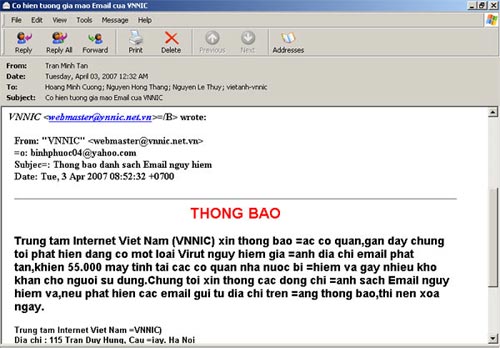Watch out for VNNIC impersonation email to spread viruses!
About two days ago, a series of emails pretending to be Vietnam Internet Network Information Center (VNNIC) sent out virus warning messages, but the emails themselves contained malicious code in the attachment to attack public users.
Email content is as follows:
" Vietnam Internet Center (VNNIC) would like to announce the agencies, we recently discovered a dangerous virus impersonating a distributed email address that infected 5,500 computers at state agencies . Please attach a list of dangerous emails in the attachment "

Image of phishing email notification of VNNIC to spread Virus attack users
The address sent from the email with the above content is clearly VNNIC, but in fact, this is a fake email!
The attachment that the fake email explains is that the "dangerous email list" is actually a virus called Dropper.Mdrop.AC .
Recommendations when interacting with email with attachments :
- Be wary of attachments you do not require, even those files that are sent from acquaintances - Because an email with a sender address is familiar does not mean it is sent from that person. If possible, check the authenticity from the sender before opening the attachment.
Be careful with messages from ISPs, software firms, online Game companies, etc., require opening or installing attachments. These companies and organizations do not send software via email but always request to download directly from their official website.
- Save and scan any attachments before opening them
- If you have to open an attachment before you can authenticate the source, do the following:
(1) Ensure anti-virus software is up to date.
(2) Save the file to a computer or a certain drive.
(3) Scan the file manually using antivirus software.
(4) Open the file.
Turn off the automatic download of attachments of mail reader software.
- Consider additional measures - Filter attachment types using the email software's attachment type limit options or use a firewall.
Source: VNCERT
Immediately after receiving the above information on virus distribution, VietNamNet has contacted VNNIC directly to clarify the incident.
Mr. Pham Viet Anh - Head of VNNIC's Executive Technical Department said: " This is a form of forging VNNIC's email address to spread viruses ".
VNNIC representatives also stated that the type of fake VNNIC email address to spread malicious code to attack users may have many other forms, not just one specific content as mentioned above.
Therefore, Mr. Viet Anh emphasized: " VNNIC has never sent emails related to virus warning! Previously, emails sent from VNNIC mainly in the function of the center are related to domain name issues. such as Domain Name Expiration Notice, or email contact with domain name holders upon request for changes, inquiries .
Immediately after receiving information from malicious customers due to receiving fake messages as above, VNNIC has sent a notice to VNCERT Center (Ministry of Post and Telematics), BKIS Center (Hanoi University of Technology) and VietNamNet to provide timely processing information and warn users.
Mr. Do Ngoc Duy Trac - Head of VNCERT's operational department made a recommendation: "It is very easy for hackers to fake email addresses from email, so users need to be very careful with email Similar content (with address sent from VNNIC and attached file) . "
" If you find similar problems, please inform VNCERT again via email ir@vncert.vn or via phone number 04.9445510. One more thing to do is update your existing antivirus program and Hacker can fake email addresses from other companies, organizations ., even VNCERT, for VNCERT Center, we never send email attached. files to users and every business email use electronic signatures compatible with OpenPGP standards so that the recipient can check the authenticity ".
There are still no statistics on the exact time the virus was released on the network, the number of infected victims as well as the level of danger of this virus. However, the number of infected computers can be quite large because information from VNCERT shows that hackers distribute viruses in the form of spam mail - send bulk spam to all users that they have email lists.
The Phong